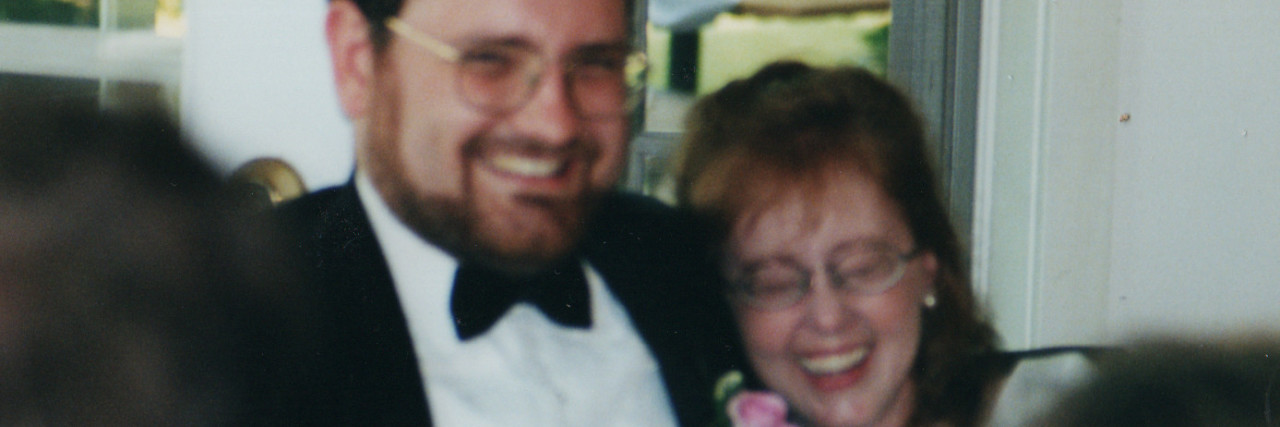It was a warm, sunny afternoon in late July 2000, and a light breeze blew through the open French doors of the intimate banquet space on one of Minnesota’s sparkling rivers. My husband and I were sitting together, and I’d just tried to feed him a piece of my cake, which he had (in typical slapstick fashion) pretended was poison. We were laughing hard, and the others at our table were laughing affably with us. A perfect day, my wedding day — and a day that for years I’d believed would never happen for me.
I was diagnosed with juvenile rheumatoid arthritis (now juvenile idiopathic arthritis) at age 8, and I’m now 49. Across that span of years, I’ve had many people ask me what my condition is, and often, when I tell them, they tell me how sad they are for me, or how tragic it is that someone so young was struck with arthritis.
I won’t pretend that having a severe case of JIA has been easy; in fact, among those feeling pity for me was myself, for years after my diagnosis. No medication seemed to help the JIA for more than six months, and most of my body was near-constantly wracked with pain and swelling. Sometimes, I could do almost nothing for myself; my mother would have to help me use the toilet and brush my teeth for me. While my friends were discovering boys and going on dates, I was feeling good if I could put enough weight on my feet to transfer myself from my wheelchair to my bed. Self-pity came too easily for me, and with it, a black cloud over my future. I could not imagine ever becoming independent: living on my own, driving a vehicle, working, or dating.
But I finally learned to move beyond my gloomy outlook on life and understand that my illness has not been a singularly bad thing. Not by a long shot. I would tell my young self and others who would pity me that having JIA has given me many gifts. Here are just a few:
1. Resilience. I had to learn at an early age how to cope with severe pain, and I figured out a way of meditatively concentrating on the joints that hurt to ease the pain, when nothing else would help. I learned to push through how I felt when I needed to, drying my tears just as the accessible van pulled into our driveway to take me to school; standing on swollen knees and ankles to give presentations in classes; learning to ignore the stares I got from people who weren’t used to children in wheelchairs. And I’ve become fiercely independent. For instance, I’ve often taken a taxi on my own or driven myself to the ER or to have surgery.
2. Compassion. I know what it’s like to be in a lot of pain, to have one’s body seem like an enemy, to face the loss of movement and other limitations on one’s daily life. I try to draw on what I’ve felt and experienced to help me aid and show kindness to others who are suffering.
3. Less fear. When I first became ill, I was terrified of needles or anything that might hurt. But I learned to handle needles and other painful procedures and now almost laugh to think I was frightened of getting my blood drawn, even if I do have terrible veins. I used to be squeamish at the idea of having my insides opened up, but many major surgeries later, I know that I can handle any operation. I may get anxious beforehand, but I have tools to handle that, too, and it’s short-lived.
4. Creative problem-solving and flexibility. With many damaged and destroyed joints, I’m unable to do simple tasks the way most people would, and sometimes new limitations arise unexpectedly, so I’ve had to figure out unorthodox methods for those tasks. I use my teeth, for instance, to bite down on nail clippers to clip my fingernails, since my fingers won’t grasp or pinch the clippers. And in a larger sense, JIA has taught me to think flexibly about my life. When I could no longer play outside as I loved to do, I put my heart into the piano. When I realized the increasing destruction of my hands meant I’d never be a concert pianist, I turned to music history and analysis and eventually got my graduate degree in that field. It was while doing that graduate work that I met the great guy I married.
My illness, in short, has shaped who I am. And I don’t think that’s a bad thing.
We want to hear your story. Become a Mighty contributor here.

